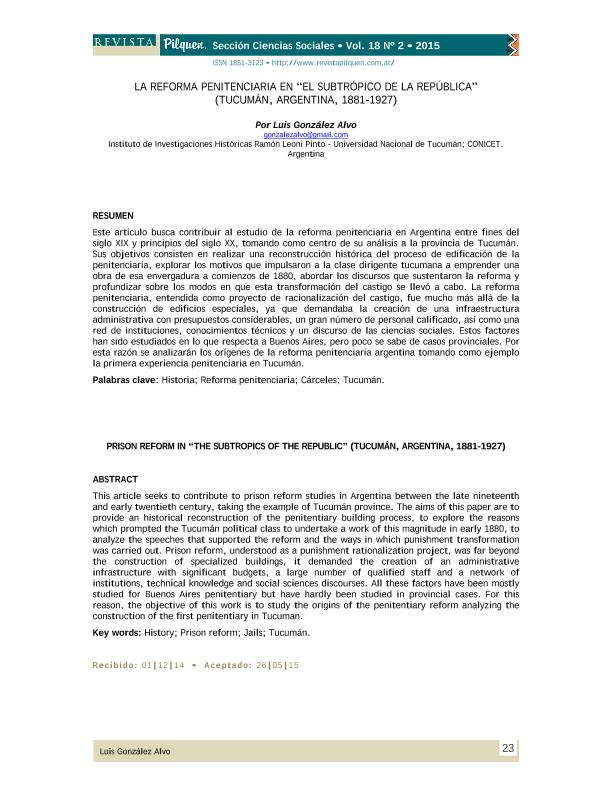Mostrar el registro sencillo del ítem
dc.contributor.author
González Alvo, Luis Gabriel

dc.date.available
2017-02-13T21:27:04Z
dc.date.issued
2015-08
dc.identifier.citation
González Alvo, Luis Gabriel; La reforma penitenciaria en "el subtrópico de la república" (Tucumán, Argentina, 1881-1927); Universidad Nacional del Comahue; Pilquen; 18; 2; 8-2015; 23-39
dc.identifier.issn
1851-3123
dc.identifier.uri
http://hdl.handle.net/11336/12940
dc.description.abstract
Este artículo busca contribuir al estudio de la reforma penitenciaria en Argentina entre fines del siglo XIX y principios del siglo XX, tomando como centro de su análisis a la provincia de Tucumán. Sus objetivos consisten en realizar una reconstrucción histórica del proceso de edificación de la penitenciaría, explorar los motivos que impulsaron a la clase dirigente tucumana a emprender una obra de esa envergadura a comienzos de 1880, abordar los discursos que sustentaron la reforma y profundizar sobre los modos en que esta transformación del castigo se llevó a cabo. La reforma penitenciaria, entendida como proyecto de racionalización del castigo, fue mucho más allá de la construcción de edificios especiales, ya que demandaba la creación de una infraestructura administrativa con presupuestos considerables, un gran número de personal calificado, así como una red de instituciones, conocimientos técnicos y un discurso de las ciencias sociales. Estos factores han sido estudiados en lo que respecta a Buenos Aires, pero poco se sabe de casos provinciales. Por esta razón se analizarán los orígenes de la reforma penitenciaria argentina tomando como ejemplo la primera experiencia penitenciaria en Tucumán.
dc.description.abstract
This article seeks to contribute to prison reform studies in Argentina between the late nineteenth and early twentieth century, taking the example of Tucumán province. The aims of this paper are to provide an historical reconstruction of the penitentiary building process, to explore the reasons which prompted the Tucumán political class to undertake a work of this magnitude in early 1880, to analyze the speeches that supported the reform and the ways in which punishment transformation was carried out. Prison reform, understood as a punishment rationalization project, was far beyond the construction of specialized buildings, it demanded the creation of an administrative infrastructure with significant budgets, a large number of qualified staff and a network of institutions, technical knowledge and social sciences discourses. All these factors have been mostly studied for Buenos Aires penitentiary but have hardly been studied in provincial cases. For this reason, the objective of this work is to study the origins of the penitentiary reform analyzing the construction of the first penitentiary in Tucuman.
dc.format
application/pdf
dc.language.iso
spa
dc.publisher
Universidad Nacional del Comahue
dc.rights
info:eu-repo/semantics/openAccess
dc.rights.uri
https://creativecommons.org/licenses/by-nc-sa/2.5/ar/
dc.subject
Historia
dc.subject
Reforma Penitenciaria
dc.subject
Cárceles
dc.subject
Tucumán
dc.subject.classification
Otras Historia y Arqueología

dc.subject.classification
Historia y Arqueología

dc.subject.classification
HUMANIDADES

dc.title
La reforma penitenciaria en "el subtrópico de la república" (Tucumán, Argentina, 1881-1927)
dc.title
Prison reform in "the subtropics of the republic" (tucumán, argentina, 1881-1927)
dc.type
info:eu-repo/semantics/article
dc.type
info:ar-repo/semantics/artículo
dc.type
info:eu-repo/semantics/publishedVersion
dc.date.updated
2017-02-09T17:38:13Z
dc.journal.volume
18
dc.journal.number
2
dc.journal.pagination
23-39
dc.journal.pais
Argentina

dc.journal.ciudad
Viedma
dc.description.fil
Fil: González Alvo, Luis Gabriel. Universidad Nacional de Tucuman. Facultad de Filosofia y Letras. Instituto de Investigaciones Historicas "dr. Ramon Leoni Pinto"; Argentina. Consejo Nacional de Investigaciones Científicas y Técnicas; Argentina
dc.journal.title
Pilquen
dc.relation.alternativeid
info:eu-repo/semantics/altIdentifier/url/http://ref.scielo.org/c74484
dc.relation.alternativeid
info:eu-repo/semantics/altIdentifier/url/https://dialnet.unirioja.es/servlet/articulo?codigo=5277349
Archivos asociados
